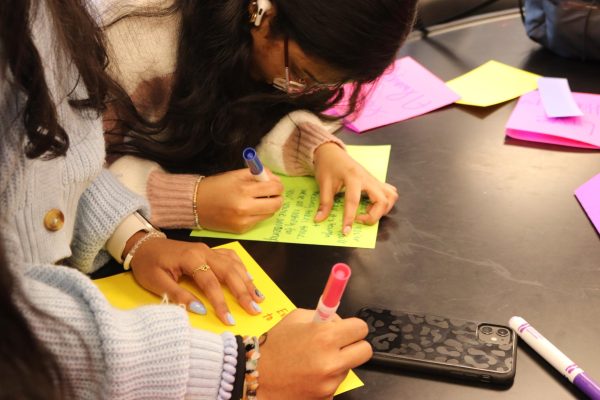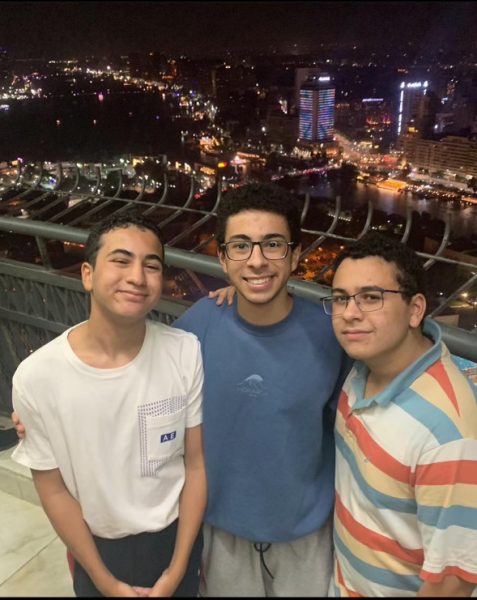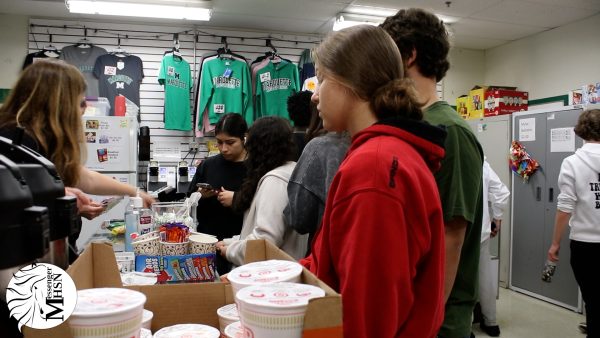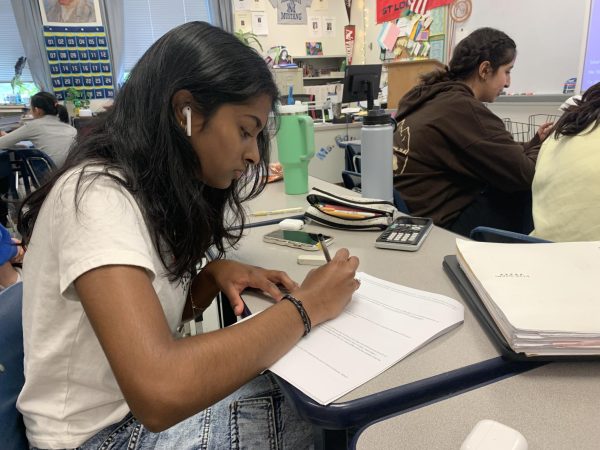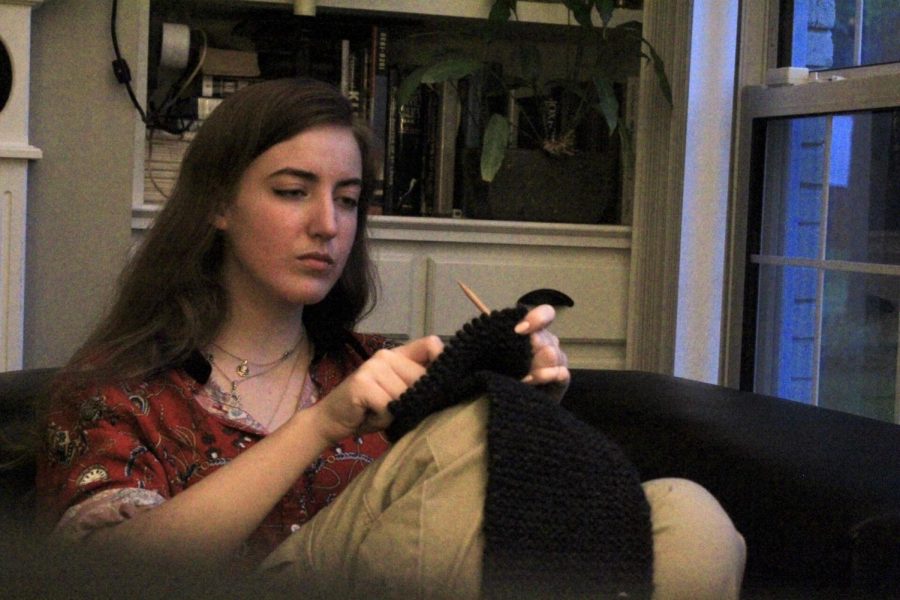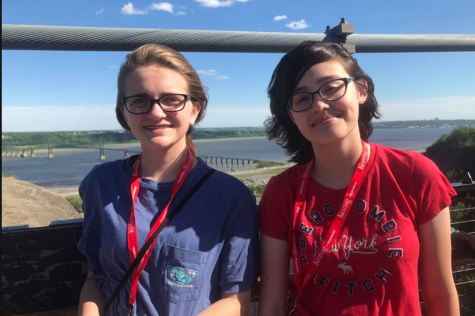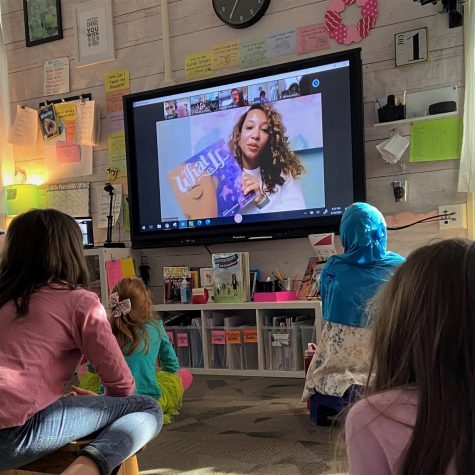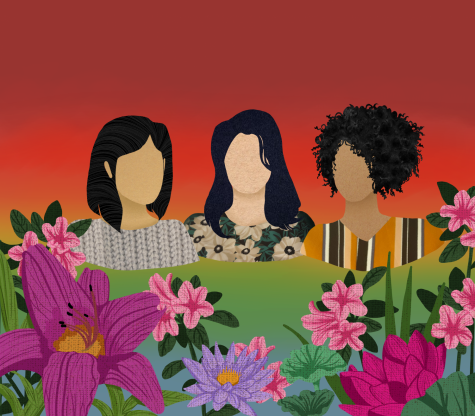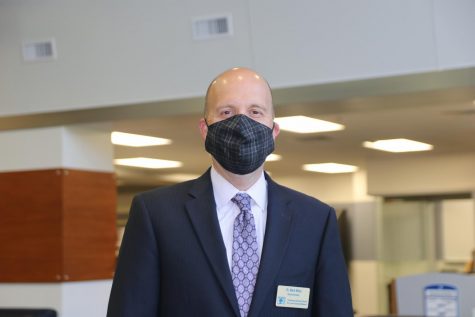COVID-19 Pandemic Presents Mental Health Challenges
Media by Grace Clutts
Grace Clutts, senior, took up knitting and painting to improve upon her mental health while during months of physical isolation due to the novel coronavirus pandemic.
Grace Clutts, senior, noticed her leadership roles and mental health awareness efforts diminish following a bittersweet end to her club’s accomplishments during the novel coronavirus pandemic.
As president of Mustangs for Mental Health (M4MH), Clutts and her members are trying to salvage the engagement and positive impact of the recently established club onto students without their in-school presence.
“Now more than ever, people need a club like Mustangs for Mental Health to get them through this and provide them with resources,” Clutts said. “People are so isolated, and it’s easy to feel so small and alone in quarantine. We wanted to do something so they could remember they’re not alone, and there’s things we are all going to be doing, sort of like a mini community.”
Clutts said club leaders were somewhat unsuccessful in coordinating new activities and events, especially in absence of their cancelled MHS Wellness Day April 2, and they resorted to sending information, ideas and messages of encouragement via social media, hoping next year’s leadership will improve upon these setbacks.
Clutts, along with federal agencies, organizations and experts, has voiced concerns about the COVID-19 pandemic negatively affecting individuals’ mental health and creating nationwide psychological trauma as citizens grapple with a lack of access to necessities, financial distress, grief, isolation and fear.
In a national survey, 45 percent of respondents showed signs of depression ranging from mild to severe, and 33 percent young adults between ages 18 to 34 reported signs of depression in comparison to 25 percent of persons aged 35 to54, according to the Healthline Mental Health Index for the week of April 26.
Dr. Carrie Lewis, PsyD, LPC, clinical psychologist, said the process of meaning making, humor and resiliency should be emphasized as much as general mental health or coping mechanisms when faced with the emotional toll, morality and disappointment associated with the outbreak.
“Teenagers are meant to be socializing, and they are reliant on their friends for their developmental stage, so this is throwing people into a state of uncertainty,” Dr. Lewis said. “Adolescents are missing milestones, and even though it’s not what they expected, it’s good to learn from this situation and find the greater purpose for this or new opportunities.”
Dr. Lewis said social isolation is more detrimental for those who are extroverted or feel they cannot share their thoughts and feelings. She is concerned about a decrease in physical contact following the immediate effects of the pandemic as well as about those who don’t have prior experience with anxiety or associated coping mechanisms.
“There are people who are just uncomfortable as well as people who are clinically anxious or have OCD, and we need to be aware of the sensitivities of others and of our own challenges,” Dr. Lewis said. “Everyone is feeling uncertain, and it can be hard to accept that you are unable to do the same quality of work you were able to do before.”
Dr. Lewis said individuals should be aware of their gut intuition concerning a rise in issues such as suicidal and homicidal thoughts as well as child, domestic and substance abuse; however, it is important to avoid overpathologizing changes in sleep, irritability and eating habits.
Dr. Lewis said she advises individuals to observe the health and mental wellbeing of others in order to capture any opportunities to allow someone to speak out and ask for help. She cautions not overemphasizing newfound difficulties due to the pandemic as unacceptable.
She said she is optimistic regarding people’s gratitude and inclination to support others and find value in jobs such as grocery and restaurant workers. Dr. Lewis said people’s concern for others’ access to healthcare when it directly affects them demonstrates societal interconnectedness sealing divisions between neighborhoods and socioeconomic classes.
“I felt society was getting really concerned about the minutiae, but this is a situation that is a real problem, so hopefully people will maintain that perspective,” Dr. Lewis said. “People are definitely emphasizing the need for support and self care, and it’s never detrimental to talk about mental health and the needs of others, even if we cannot see them.”
From perpetrators and victims of abuse to those who struggle with eating disorders and self-harm, Lewis said everyone needs to consider how others’ may be struggling. This could include reverting back to negative behaviors, lacking therapeutic or rehabilitation assistance and being overly harsh onto oneself concerning guilt and shame.
For instances like these, Brenda Casey, social worker, said she emphasizes the role of telehealth as a godsend as it substitutes for in-person health care services during periods of isolation.
Casey said she wants to promote “social distancing” as “physical distancing” to avoid the notion there will be a loss or inability to have social relationships. She recommends checking in on others and sustaining frequent contact as drastic social isolation can be warning signs for depression.
Also, she advises against increased consumptions of pandemic news coverage to ease feelings of hopelessness, fear and anxiety.
“At this point, every intelligent human being recognizes how dangerous this is; therefore, we no longer need to be watching the numbers and fixated on the never-ending information that we are getting thrown at us,” Casey said.
Casey said she expects to see an increase in reports of mental health issues as the pandemic progresses as major catastrophes can trigger problems even for those considered to be healthy and positive.
Due to this, she emphasizes establishing a social group for support as well as a healthy weekday routine: a uniform sleep schedule, regular eating and socialization periods and daily exercise.
“We will get through this, and we will come out of the other end and have learned a lot,” Casey said. “For the rest of your life, no matter what you go through, you will be able to say ‘this is nothing like what we went through in 2020.’ You will come out stronger, if you do everything you can do to keep a positive attitude.”
At this moment, district personnel haven’t provided information about new plans for mental health services for the next school year.
Contact Casey, [email protected], to learn more about MHS Mental Health Advocacy, a program to help students and families access mental health services. Any student age 19 and under has access to free mental health care.
If a student is in crisis, they can contact their school counselor, social worker, RSD Coordinator Education Equity and Diversity Brittany Hogan, [email protected], or RSD Executive Director of Student Services Dr. Terry Harris, [email protected].
If in need, call the NAMI Helpline at 800-950-NAMI, search https://www.nami.org/help, or in a crisis, text “NAMI” to 741741.
Your donation will support the student journalists of Marquette High School. Your contribution will allow us to purchase equipment and cover our annual website hosting costs. You may become a PATRON by making a donation at one of these levels: White/$30, Green/$50, Blue/$100. Patron names will be published in the print newsmagazine, on the website and once per quarter on our social media accounts.
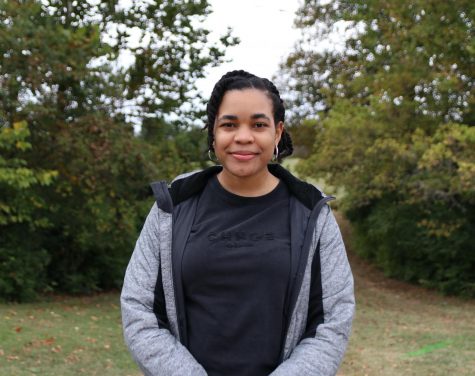
Lauren Pickett, senior, is the In-Depth Editor for the MHS Messenger. This is her second full year on staff. Also, Lauren participates in two other activities:...



